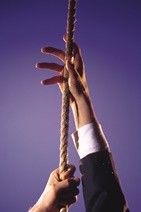 So your business may very well be feeling the pinch these days. In the federal government, however, it seems business, and salaries, are booming. USA Today recently examined the situation that has one Utah Congressman up in arms, saying "There’s no way to justify this to the American people. It’s ridiculous." The USA Today writes:
So your business may very well be feeling the pinch these days. In the federal government, however, it seems business, and salaries, are booming. USA Today recently examined the situation that has one Utah Congressman up in arms, saying "There’s no way to justify this to the American people. It’s ridiculous." The USA Today writes:
The number of federal workers earning six-figure salaries has exploded during the recession, according to a USA TODAY analysis of federal salary data.
Federal employees making salaries of $100,000 or more jumped from 14% to 19% of civil servants during the recession’s first 18 months — and that’s before overtime pay and bonuses are counted.
Federal workers are enjoying an extraordinary boom time — in pay and hiring — during a recession that has cost 7.3 million jobs in the private sector…
Key reasons for the boom in six-figure salaries:
• Pay hikes. Then-president Bush recommended — and Congress approved — across-the-board raises of 3% in January 2008 and 3.9% in January 2009. President Obama has recommended 2% pay raises in January 2010, the smallest since 1975. Most federal workers also get longevity pay hikes — called steps — that average 1.5% per year.
•New pay system. Congress created a new National Security Pay Scale for the Defense Department to reward merit, in addition to the across-the-board increases. The merit raises, which started in January 2008, were larger than expected and rewarded high-ranking employees. In October, Congress voted to end the new pay scale by 2012.
• Paycaps eased. Many top civil servants are prohibited from making more than an agency’s leader. But if Congress lifts the boss’ salary, others get raises, too. When the Federal Aviation Administration chief’s salary rose, nearly 1,700 employees’ had their salaries lifted above $170,000, too.
In the article a government affairs director for the Federal Managers Association contends, "the federal workforce is highly paid because the government employs skilled people such as scientists, physicians and lawyers," adding that federal employees make 26% less than private workers for comparable jobs.
What do you think? Is this government spending careening out of control, or are these salary increases just?
 With deference to the recently retired David Letterman, who doesn’t love a Top 10 list? Especially when the title is “The World’s 10 Most Extreme Jobs.”
With deference to the recently retired David Letterman, who doesn’t love a Top 10 list? Especially when the title is “The World’s 10 Most Extreme Jobs.”
 So your business may very well be feeling the pinch these days. In the federal government, however, it seems business, and salaries, are booming. USA Today recently examined the situation that has one Utah Congressman up in arms, saying "There’s no way to justify this to the American people. It’s ridiculous." The
So your business may very well be feeling the pinch these days. In the federal government, however, it seems business, and salaries, are booming. USA Today recently examined the situation that has one Utah Congressman up in arms, saying "There’s no way to justify this to the American people. It’s ridiculous." The